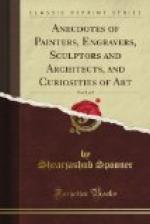to make one thyself.’ Filippo, without saying
anything more, returned home, and set to work on a
crucifix, wherein he labored to surpass Donato, that
he might not be condemned by his own judgment; but
he suffered no one to know what he was doing.
At the end of some months, the work was completed
to the height of perfection, and this done, Filippo
one morning invited Donato to dine with him, and the
latter accepted the invitation. Thereupon, as
they were proceeding together towards the house of
Filippo, they passed by the Mercato Vecchio, where
the latter purchased various articles, and giving them
to Donato, said, ’Do thou go forward with these
things to the house, and wait for me there; I’ll
be after thee in a moment.’ Donato, therefore,
having entered the house, had no sooner done so than
he saw the crucifix, which Filippo had placed in a
suitable light. Stopping short to examine the
work, he found it so perfectly executed, that feeling
himself conquered, full of astonishment, and, as it
were startled out of himself, he dropped the hands
which were holding up his apron, wherein he had placed
the purchases, when the whole fell to the ground, eggs,
cheese, and other things, all broken to pieces and
mingled together. But Donato, not recovering
from his astonishment, remained still gazing in amazement
and like one out of his wits when Filippo arrived,
and inquired, laughing, ’What hast thou been
about, Donato? and what dost thou mean us to have
for dinner, since thou hast overturned everything?’
‘I, for my part,’ replied Donato, ’have
had my share of dinner for to-day; if thou must needs
have thine, take it. But enough said: to
thee it has been given to represent Christ; to me,
boors only.’” This crucifix now adorns
the altar of the chapel of the Gondi.
DONATELLO.
This old Florentine sculptor was born in 1383.
He was the first of the moderns who forsook the stiff
and gothic manner, and endeavored to restore to sculpture
the grace and beauty of the antique. He executed
a multitude of works in wood, marble and bronze, consisting
of images, statues, busts, basso-relievos, monuments,
equestrian statues, etc. which gained him great
reputation, and some of which are much esteemed at
the present day. He was much patronized by Cosmo
de’ Medici, and his son Pietro.
Among Donatello’s principal works, are three
statues, each three braccia and a half high, (Vasari
erroneously says four, and each five braccia high),
for the facade of the church of Santa Maria del Fiore,
which faces the Campanile. They represent St.
John; David, called Lo Zuccone (so called, because
bald-headed); and Solomon, or as some say, the prophet
Jeremiah. The Zuccone is considered the most extraordinary
and the most beautiful work ever produced by Donatello,
who, while working on it, was so delighted with his
success, that he frequently exclaimed, “Speak
then! why wilt thou not speak?” Whenever he wished
to affirm a thing in a manner that should preclude
all doubt, he would say, “By the faith I place
in my Zuccone.”




